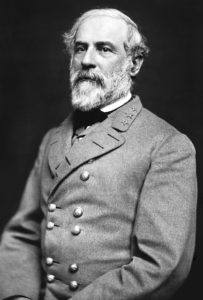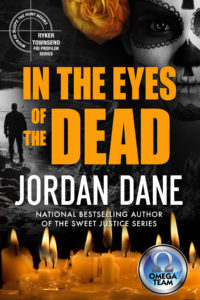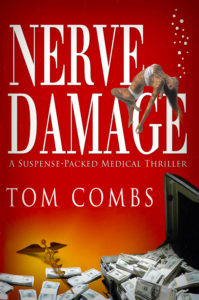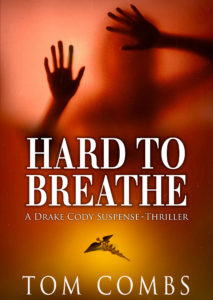By PJ Parrish
Well, it’s time. It’s Tuesday, Nov. 8 and you have to make a choice.
No…not that one. We here at The Kill Zone are fiercely apolitical, so what you do today in the privacy of your little curtain or cubbyhole is your business alone. I’m talking about more important choices today -– about your novel.
But first, let’s pause for a short break. I am PJ Parrish and I approve this message:
Shoot, I’d vote for this guy. He makes as much sense as anybody running today. Okay, back to regular programming.
When you sit down to write a novel, you may not realize it, but you will be — for the next six months to six years it takes you to finish — constantly making choices. Some of these choices will be as big and strategic as picking your characters and plot. Others will be tactical choices like grammar, word choice, use of imagery, punctuation, chapter length, even book length. These latter choices are all really important and we’ve covered all of these topics here at TKZ. But today, let’s hone in on the big choices.
Yes, we’ve covered these a lot here, too. But on this, ahem, really yuge election day, I think it’s a good time for review.
The Ten Most Important Choices You Make About Your Novel
1. Who’s story is this? This sounds simplistic, but you must be clear about who you are going to focus on for your readers to follow. Now usually (but not always), you want to chose a single protagonist, one main person who will be challenged, who will triumph (heroic) or fail (tragic), and who will be the central figure in the story’s plot arc.
Can you have more than one protag? Well, yes. But in my humble opinion, a dual (or multiple protag) book is harder to pull off. Why? Because unless you are really good at weaving the threads of plot and motivation, you will probably understand or even favor one protag over another — and readers will really miss that person when they are “off stage.”
I recently critiqued a manuscript whose author couldn’t make this choice. She had created four equal main characters, but none really captured my interest. I asked the writer why she had done this and she said that her “real” protag was her setting. I advised her to go read Joseph Campbell’s The Hero’s Journey:
A hero ventures forth from the world of common day into a region of supernatural wonder: fabulous forces are there encountered and a decisive victory is won: the hero comes back from this mysterious adventure with the power to bestow boons on his fellow man.
The “region of supernatural wonder” can be the Hogwarts School of Witchcraft and Wizardry or a bar in Cleveland, if you want. But we must have someone to care about, someone we are willing to follow for 300 pages.
2. Where am I? It surprises me how often writers neglect this. Yes, all fiction takes place somewhere, but unless you make that your setting come alive in your reader’s imagination, you are just moving characters against a cardboard backdrop. Do you need to “write what you know?” Not really. You needn’t have lived in Belle Epoque Paris to be convincing, but you need to do your homework and create not reality but verisimilitude (the appearance or being real and convincing). Do your homework (Guest poster Barbara Nickless had a good take on this yesterday.)
And establish your setting very early in your story. Readers need to know where they are from the get-go, and while you don’t want to slow things down in your opening chapter(s) with too much description, you need to begin setting your scene early. And no, hanging one of those pitiful little taglines on chapter one — QUANTICO, VIRGINIA — won’t cut it.
Behavioral Science, the FBI section that deals with serial murder, is on the bottom floor of the Academy building at Quantico, half-buried in the earth.
That’s one of my favorite opening lines from Thomas Harris. He didn’t need a tagline, just those fabulous final five words.
3. What’s your point of view? So who is going to be your narrator? Sometimes, this can be a secondary character. Jay Gatsby is the protagonist of Fitzgerald’s classic, but the story is related by Nick Carraway. Most likely, your narrator will be your protagonist. So do you use first person or third person? Your choice. First-person is more immediately intimate because having your protag relate everything via “I saw” “I did” or “I thought” you establish a tight bond with the reader. But this is also very limiting as everything must be filtered through one prism. I think first is harder to write than third. Why? Because if you whiff on motivation, if you don’t grasp every nuance of your protag’s psyche, your narrator will feel flat. And if he’s boring, well, shoot…there goes the reason to turn the page.
Having trouble with this? Switch from first to third or vice versa. You may discover the plot you are dealing with demands the richer variety and complexity of a third-person vantage point. Or you might need multiple third-person POVs. Your protag may be doing a Diana Ross but she might need Mary Wilson and Florence Ballard backing her up.
Time for another break. I’m PJ Parrish and I approve this message:
I’d vote for that guy, too. He’s crazy but at least he’s honest. Back to your book:
4. What’s the best entry point? Let’s start with a premise: A rich teenage girl disappears from in front of a nightclub in London, snatched by a man re-inacting Jack the Ripper murders. A disgraced female cop who’s trying to reconnect with her own estranged daughter gets the case. Where do you start this story?
Bad starts: From victim’s POV: She wakes up, eats breakfast, has testy phone call with mom and later that night goes to nightclub. Cop’s POV: She’s sitting at her desk, thinking about her bad job and her lost relationship with daughter. From killer’s POV: he is watching girl exit the nightclub thinking about what he is going to do with her.
Why are these bad? The first is throat-clearing. Yes, you might want to establish sympathy for the victim but you can do this after she is gone or even in a few good tense ACTIVE moments in the nightclub. The second example is back story that should be dribbled in as the plot begins to unfold. The third example, while it sounds juicy, it has become a giant cliche. If you open this way, it must really be original, and you will then need to go back to the killer’s POV at other times in the book or the opening scene feels tacked on and artificial.
When considering where to start: Get in as late as possible but still be clear in what has already happened. Pick a moment where something is happening or about to happen, where a status quo is changing, where someone is about to be challenged.
Prologues? That’s a whole post in itself. I generally don’t like them because they are almost always mis-used. If you have one, cut it out and see if you can start your story in chapter 1. Betcha it works.
5. What does your hero want? Ray Bradbury said all you have to do is figure out what your hero wants then just follow him. Easy for him to say! Plumbing the depths of motivation is the key to creating characters who live on the page. I’ve written about this often because I think that once you, the writer, can answer this question, everything falls into place. It’s helpful to think of “want” as having many levels. In Silence of the Lambs, what does Clarise Starling want? Easy — to catch Buffalo Bill. But go deeper into her psychological basement:
- To catch Buffalo Bill
- To save Kathryn
- To prove she can make it among the boys of the FBI academy
- To impress her boss Bill Crawford
- To make her dead father proud
- To silence the lambs (her demons over being orphaned as an innocent girl)
Do this for your protag, then for your villain and everyone in your book if you can. Remember what Kurt Vonnegut said: “Every character should want something, even if it is only a glass of water.”
6. What happened? This is simplistic, too, but needs to restated: Something has to go south fast. As you concentrate on character, don’t neglect story. Your hero needs an obstacle to overcome. As Stephen King says in On Writing: “In many cases when a reader puts a story aside because it ‘got boring,’ the boredom arose because the writer grew enchanted with his powers of description and lost sight of his priority, which is to keep the ball rolling.” You must create obstacles for your hero to overcome (Sheriff Brody in Jaws has not just a killer shark to hunt down but he has to deal with a dumb mayor, a rift in his team (Quint and Hooper) and he can’t swim. I love what sci-fi fantasy author Nancy Kress says about plot: “Fiction is about stuff that’s screwed up.”
Uh-oh…we gotta break again. I’m PJ Parrish and I approve this message:
I’d definitely vote for that guy, but I think Ted Cruz might gnaw him down to bones. Back to your choices:
7. What are you trying to say? Samuel Goldwyn famously said, “If you want to send a message, call Western Union.” Well, yeah, I sorta of agree with that. Especially since I just finished a mystery that was about meth addiction in Appalachia. It was good but after a while I just thinking, “enough with the drug thing. Who killed that old man?” The writer was so enamored with his message, it let the story go flaccid. However…
Great books are always about a theme. Herman Melville said, “To produce a mighty book, you must choose a mighty theme.” So Moby Dick is not just a fish tale. It is about man’s inability to know God. But merely good books also have something to say. You can hear the theme humming soft and steady beneath the clanging machinery of the plot. At its best, a theme has some sort of meaning to your protagonist, even in genre fiction. Which brings to mind Joseph Wambaugh’s quote, “It’s not how the detective works the case but how the case works on the detective.” This is a little facile, but here’s an interesting list of common fiction themes — everything from abuse of power to xenophobia.
8. What do I call this? Let’s talk about titles. I know, I know…you don’t want to because titles are hard. And if I know you, you’ve probably slapped something gawd- awful on your work in progress just so you can find it in your computer. But here’s the thing: A good title can make or break your chances out there. I’d go so far to say it’s the single biggest marketing decision you will make. A good title is a neon sign to your readers, not just luring them in but signaling in shorthand what your story is about. And maybe most important, a good title helps you, the writer, understand at a very basic level what your book is about. You need to think about this until your brain hurts. You need to wake up in a cold sweat at night over this. Don’t settle.
What makes for a great title? It’s pithy, it has promise. It’s a tease and a tell. It’s memorable, original, and easy to say. It boils your entire story down its essence and conveys its heart. This topic needs its own post to do it justice, so for now, just Google and read up on the good advice out there. Good titles: Hunger Games. The Last of the Mohicans. To Kill a Mockingbird. Bad: I can’t print most of them here. Click here.
Another break? Geez. I’m PJ Parrish and I’m getting tired of approving messages.
It’s all a blur but I am pretty sure I voted for that guy. I like his wife. Maybe she’ll run someday…
Back to your own choices:
9. What is my tone? This is important but sort of slippery to grasp. It’s important, however, because if the tone of your book is off, you’re going to have trouble selling it to agents and editors or, if publishing it yourself, finding your target audience. The tone is your attitude or feelings toward your subject matter. You convey this through your style, word choice, and through the personalities of your characters. If you’re writing for a genre audience, getting your tone right is important because readers have certain expectations. A reader looking for light romance suspense doesn’t want to open your book and discover halfway through that you’ve started out light and descended to a darker place. Likewise, if like me, you prefer darker fare, you don’t want to be misled in the opposite direction.
Your chosen tone can be whimsical, humorous, gloomy, ironic, hardboiled, neo-noir, …you pick it. But you must be honest and consistent. Years ago, I wrote an amateur sleuth novel that I thought was peachy. It was roundly rejected, despite the fact I had a good track record with my current series. What happened? My tone started out light and wacky but veered toward the dark about halfway through. Two editors even used the same words in their rejection letters: “Loved the writing but it’s neither fish nor fowl.” I learned a lesson — I can’t maintain soprano when my true voice is contralto.
10. Do I finish this book or start over? No one can help you with this, but it’s something you have to ask yourself as you move along. Not every book needs to be finished. Some are exercises of sorts to help you learn. Others might be short stories instead of novels. And then there is the question of stamina and confidence. If you do believe in your story, then yes, you need to finish it. Even if it never gets published, it won’t be wasted effort. Every successful writer out there has unpublished manuscripts moldering in bottom desk drawers or lurking on old thumb drives. You need to finish something. Just for the knowledge that you can do it.
I’ll leave you with a telling quote from Erica Jong: “I went for years not finishing anything. Because, of course, when you finish something you can be judged.”
Yes, you will. Don’t be afraid of it. It’s called being a professional writer.
And finally, one last break. I’m PJ Parrish, and I think this candidate speaks for all of us very weary voters out there:










